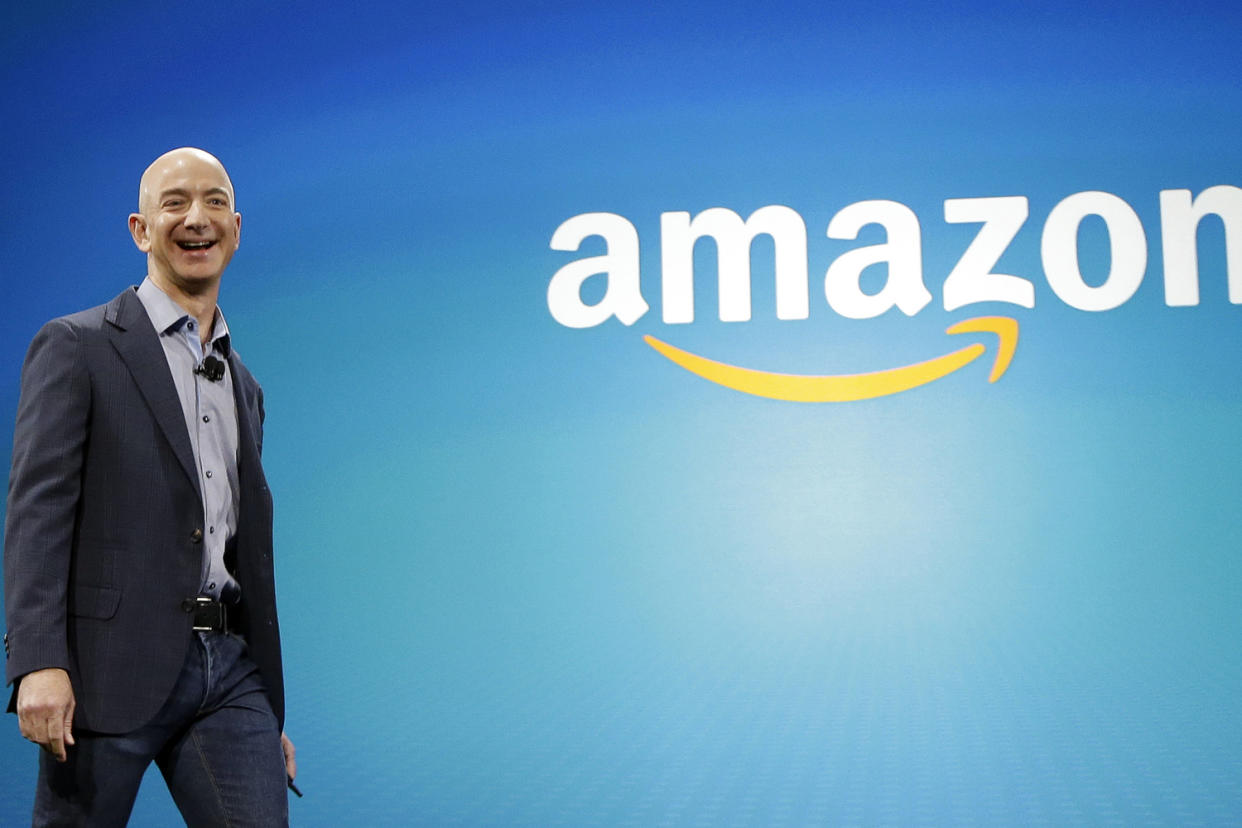Richard Godwin: Think before you click: the ease of Amazon shopping also has social costs

All right, ’fess up. How many times have you done this? You’re walking down a beleaguered high street when you spot an independent shop.
Perhaps it sells books. You spend 25 minutes flicking through zeitgeisty volumes, chatting to the owner, thinking how nice bookshops are. Perhaps it sells toys. You let your child lob around some wooden trains as you choose a puppet for your niece. Perhaps it’s one of those Scandi design shops selling aspirational bits of pine. To be honest, I have no idea what you’d do in one of those shops.
Certainly, when it comes to actually buying something, you check the price and think: “Whoa, £16.99? For a plastic Stegosaurus/work of literature/bit of pine? I bet it’s cheaper on Amazon!” If you’ve been effectively primed, you’ll order it on the Amazon app there and then. And why not? Usually only your conscience stands in your way — and I don’t know about you but mine sounds increasingly sanctimonious.
Amazon’s sheer utility often makes it seem like the most benign of the tech giants. But it’s arguably the most disruptive. Apple and Microsoft are computing companies; there are natural limits to the number of people who will want their products. Google and Facebook are basically advertising companies; advertising is only ever going to take up a certain percentage of the economy. Amazon’s scope is almost limitless, not only e-commerce but commerce in general. “It is my confessor, my keeper of lists, a provider of food and culture, an entertainer and educator and handmaiden to my children,” complained one commentator who had fallen for its live-in salesrobot, Alexa.
The company’s CEO, Jeff Bezos, seems to want his fingers not only in all the pies, but the pasties, quiches, tortas, empanadas and pierogi too. He already owns the Washington Post. Today, the board of the US supermarket Whole Foods is voting on whether to approve Amazon’s £10.7 billion buyout, which would add 466 American retail stores and a mooted grocery delivery business to the company’s portfolio. Amazon now intends to sell cars in the UK, as it already does in France and Italy. Traditional car dealers must contend with a £170 million rise in business rate over the next five years. Amazon somehow got away with paying £7.4 million corporation tax on its £1.46 billion UK revenues last year.
Aren’t there monopoly laws to prevent this sort of thing? President Trump was not wrong when he tweeted: “Amazon is doing great damage to tax-paying retailers. Towns, cities and states throughout the US are being hurt — many jobs being lost!” The problem is, he lacks the mental acuity or political will to do anything about it. And Amazon has always benefited from a tragic flaw in US monopoly law that says as long as the consumer benefits from lower prices, all is well.
The EU is smarter when it comes to antitrust — challenging Amazon’s monopoly on ebooks, for example — but we still haven’t grappled with Amazon’s parasitical business model. As my high street scenarios show, often it’s smaller businesses that suffer. It’s they who pay the rents, business rates, corporation tax and wages, and Amazon that benefits from using them as an effective showroom. These businesses usually add value to their communities. Amazon subtracts it.
It might be worth borrowing an idea from the environmental movement: factor in the “externalities”. Pollution is a classic negative externality: burning fossil fuels has a social and ecological cost that someone other than the polluter will pay down the line. It’s sensible to include that in the price cost. You might say the same of Amazon’s business practices.
It ought to be possible to come up with a pricing system that takes account of externalities, both positive and negative. It’s what the tax system is supposed to do. But that would require making value judgments beyond cynical calculations of cost.

Let’s put statues up to my ‘Why?’ test
There's a petition to erect a statue of the R’n’B singer Missy Elliott in Virginia. I can’t see the problem. The author of Get Ur Freak On, above, has made as important a contribution to American civilisation as anyone these past 20 years or so.
She seems less controversial than, say, an insurgent who killed thousands of Americans to preserve the institution of slavery a century and a half ago.
Here is one way to think about the statue debate — and we can walk and chew gum on this issue, as the Americans like to say. I’ve certainly begun to pay more attention to the figures occupying our own civic furniture. Why this person of all people? What’s St Volodymyr of Ukraine doing on Holland Park Road? Why is there a naked man on a horse sitting in a Caffè Nero on Piccadilly? Is conqueror of India General Sir Charles Napier —“The best way to quiet a country is a good thrashing, followed by great kindness afterwards” — more worthy of his place in Trafalgar Square than any other British person of the past 150 years?

 Yahoo News
Yahoo News 
